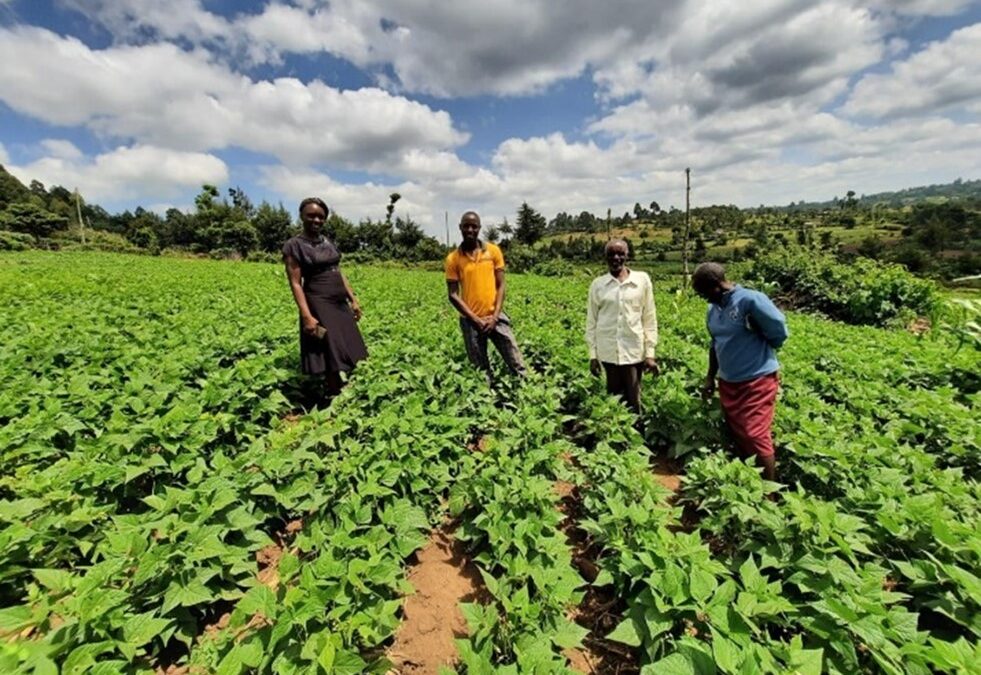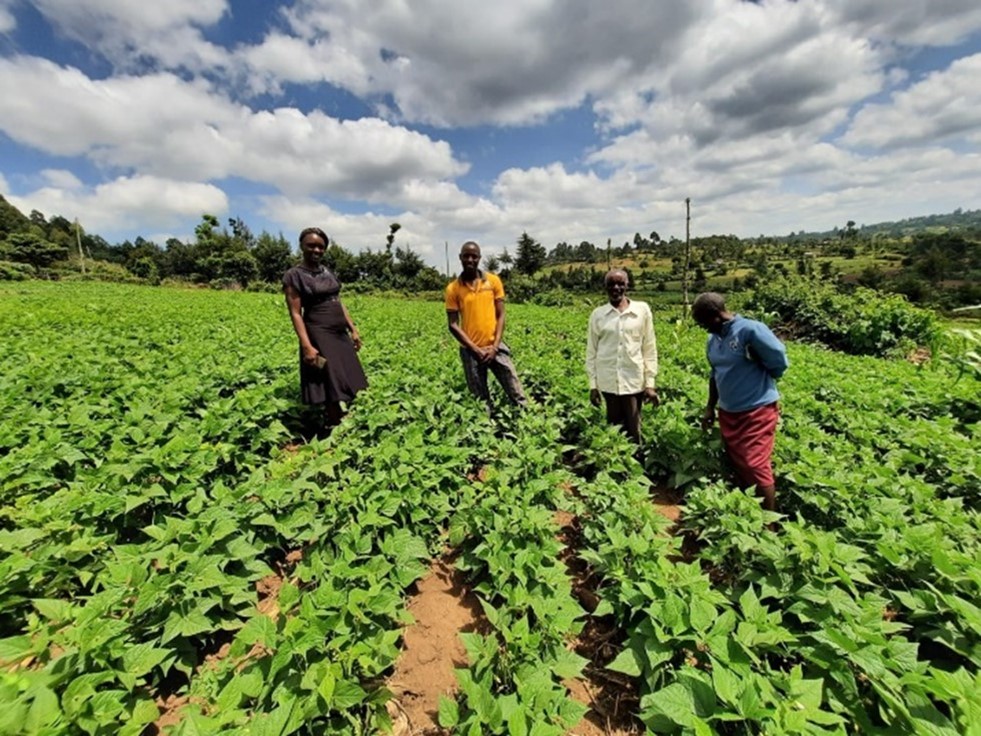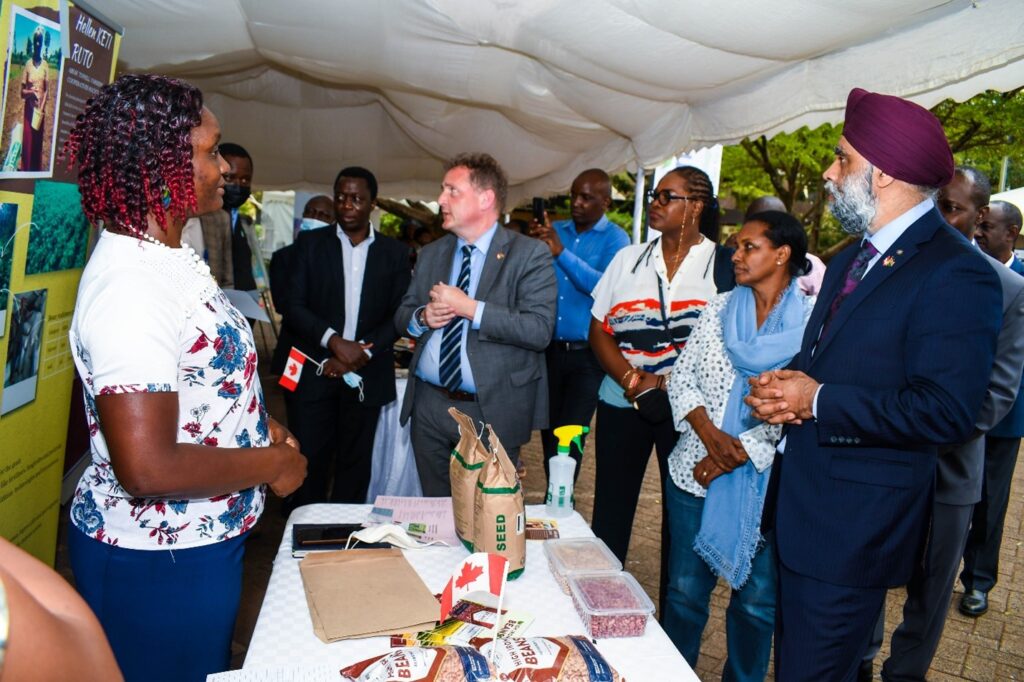by Helen Keti, Patricia Onyango
Beans in Bomet county in Kenya are mostly grown for home consumption. If excess is available, the extra beans are sold in the local market or at the farm gate, especially among women, who have limited access to markets due high cost of transporting the beans. in addition, the malnutrition rate in Bomet County is high, with 51% of pregnant women suffering from anaemia and 36% of children under five stunted. Abosi Top Hill Farmers’ Cooperative Society Limited started as Abosi Vision 2030, with the intention to support its members in agricultural production and marketing, to generate income and improve foods security and health.
In 2019, the Alliance of Bioversity International & the International Center for Tropical Agriculture (the Alliance) through the Pan Africa Bean Research Alliance (PABRA) conducted intensive awareness campaigns on the benefits of growing high iron and zinc beans. The campaigns were carried out in partnership with the Cereal Growers Association (CGA), the Kenya Agricultural & Livestock Research Organization (KALRO), and the County Government of Bomet.
A series of bean production demonstrations plots and field days were set up in various farmer fields in Bomet County. The farmers were taught how to access quality seed, manage their bean farms, and increase yield. The number of farmers growing the improved beans increased as more farmers recognized the good performance of new bean varieties and the accompanying good agricultural practices.
Among the three new high iron and zinc beans (Angaza, Faida, and Nyota), the Nyota bean was selected because of its early maturity (about 65 -75days) hence capacity to escape droughts in case the rains stop. It is also within the red mottled class which has a huge market in East, West, and Central Africa.
Faida, another red mottled bean was selected because of its market acceptance and the attractive large size and weight for the market. Angaza was selected because of its high yields and tolerance to pests and diseases. In February 2021, Abosi Top Hill Cooperative purposed to engage in farming beans as a business. Gorgor in Ndanai/Abosi Ward was mapped as one of the production hubs in the wider Bomet Bean Corridor. A pre-season production planning and training meeting was facilitated by KALRO and PABRA. Farmers enrolled into production groups and strategized on how to access seed and inputs to invest in their farms. Throughout the season, the researchers from KALRO and PABRA, and producers engaged in regular interactions addressing any emerging challenges especially good agronomic practices such as identifying crop nutrient deficiencies, pest and diseases management, as well as post-harvest loss and handing.
As result of these exciting impact and benefits, Abosi Top Hill Farmers’ Cooperative membership grew from 85 to 150 members, with more than 70% being women. Helen Keti Ruto, the Chairperson of the cooperative, beams with satisfaction as she recalls how the journey started. “This is our first time to produce this much beans. Previously, we produced small volumes of beans often sold locally. This time, our two stores are full of over 100 bags of beans, and we can afford to call in an off-taker with a 10-ton lorry to buy the beans!’ she explains as she guides the group members on how to grade, pack and load the sacks on the truck.
The group, through PABRA courtesy of project funding by the Global Affairs Canada and the Swiss Agency for Development and Cooperation (SDC) benefited from a donation of a motorized knapsack sprayer, tarpaulins for drying their harvest, hermitic bags for grain storage, and a motorized bean thresher to ease drudgery during threshing beans using sticks, especially among women. These items came in handy to support farmers producing the beans during these challenging times on the COVID-19 pandemic. The farmers under the cooperative aggregated 15 MT of Nyota, 2.5 MT of Angaza, and 2 MT of Faida ready for sale. The beans were supplied by about 100 farmers.
Working in collaboration with HarvestPlus and Global Alliance for Improved Nutrition (GAIN) under the Commercializing Biofortified Beans (CBC) project, linkages to a bean processor- Spice World – were facilitated. The farmers engaged in a negotiation leading to the off taking of the first batch of 10MT of beans worth approximately Ksh. 1 million (USD 10,000). The village had never earned this amount of money before in a single transaction of bean sales.
The bean harvesting coincided with the schools opening, particularly the enrolment of students to secondary school. This is a time when parents are under extreme pressure to pay fees on admission. Of the farmers who supplied beans to the cooperative, 95% required the cash to pay for school fees. Jonah Ruto, a farmer in Gorgor, Bomet County was excited to share that she grew Nyota bean on an acre and harvested six bags. She said: “From the beans harvested, I set aside two sacks for home consumption and sold the other four to our Cooperative and used the money to pay school fees for our child joining Form one at Boito Secondary School in Konoin Sub County.’
Lastly Helen said, “We are excited to see how this first trial has come out. It is proven that we can produce beans both for household consumption and for the market. Our target is to double the production of high iron and zinc beans in the coming seasons. Organizing the farmers under cooperatives is one key lesson I have learnt to maximize bean production, aggregation and marketing. It helps with bargaining for better prices collectively.



